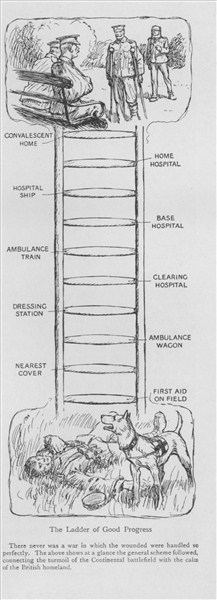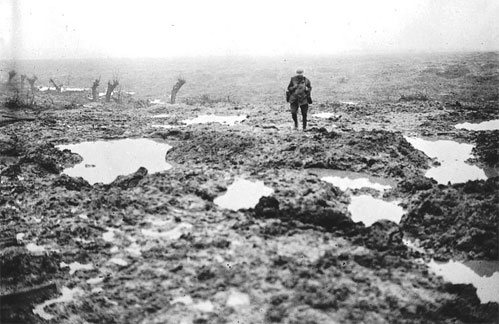
Saturday, 26 July 2008
Monday, 21 July 2008
November 1917 Part II
When I last left off, Jack had just been taken off the lines and invalided back to England due to acute appendicitis. After leaving the casualty clearing station, Jack would have been put on a transport and taken back to England. There he was admitted to the 1st Southern General Hospital in Birmingham on November 10th. By 1917 the 1st SGH had a capacity of 2400 beds. On November 17th, Jack was Struck off Strength from the 123rd Pioneer Battalion.

All though military hospitals could be upsetting places to be for the soldiers there, especially if one had lost a limb or the use of his legs, they were also seen as a refuge from the battlefield. After many months of living in trenches, a hospital must have seemed like a dream come true. Regular meals, clean sheets, baths, activities and leave to cities or towns, were all luxuries a soldier might not have experience in a while.
Jack was placed in Ward B1 and continued to recover from his surgery. Whether there were complications or Jack was just a slow healer, the Doctor noted that it was not till the 28th that the stitches were able to be removed and the surgical wound began to heal properly.
At the close of November, Jack still resided in the hospital, awaiting to be discharged and sent to one of the many convalescent hospitals in England.


All though military hospitals could be upsetting places to be for the soldiers there, especially if one had lost a limb or the use of his legs, they were also seen as a refuge from the battlefield. After many months of living in trenches, a hospital must have seemed like a dream come true. Regular meals, clean sheets, baths, activities and leave to cities or towns, were all luxuries a soldier might not have experience in a while.
Jack was placed in Ward B1 and continued to recover from his surgery. Whether there were complications or Jack was just a slow healer, the Doctor noted that it was not till the 28th that the stitches were able to be removed and the surgical wound began to heal properly.
At the close of November, Jack still resided in the hospital, awaiting to be discharged and sent to one of the many convalescent hospitals in England.

Wednesday, 9 July 2008
November 1917: Part I

I'm doing November 1917 in two parts for reasons that will be made clearer as you read on. As I left off in the last post, Jack's battalion had just been sent to Ypres to participate in the capture of Passchendaele. He and three hundred and forty five other men in his battalion had just been picked as stretcher bearers to assist in carrying out from the battlefield the ever increasing causalities. On October 30th, the Canadians, along with two British divisions attacked the town and managed to gain the ruined outskirts of the village. From there, they hung on, through rain and shell fire.

For Jack, the 1st of November, began with an intense barrage near their billets. No casualties were reported and it soon became an every day occurrence. The job of a stretcher bearer was one of the most hazardous on the Western Front. With the heavy rains, it sometimes took four men to carry a stretcher, and then there was the mud. Stretcher bearers had to pull themselves out of the mud after every step.
Wallace Carroll, 15th battalion CEF, was detailed as a stretcher bearer during the Battle of Passchendaele for the 3rd Battalion.
So I don't now how that worked out but our company got detailed as stretcher bearers, and we had one stretcher to four men. And we went on up they kicked off early in the morning and oh about eight o'clock we were sent in to pick up the wounded. Well the Commanding Officer of the Third Battalion he wouldn't allow us to go on any further. It's no use he said, you'd never get them, and he said, you'll never be able to get them out. The mud and the water up there was terrific but by the time we got as far as we did we were all soakin' wet. The shell holes were so close together and everyone was full of water see, that was low land country up there and the canals and the dikes you know up there had all been cut you see. And the water overflowed into the low country and consequently every shell-hole up there were some shell holes up there you could get out and paddle around in a canoe in them, and they were quite big. You could drown up there quite easy if you happen to fall in them at night time.
Oral Histories of the First World War

Oral Histories of the First World War

I think it was Jack's experiences with this battle that led to his life long struggle with Post Traumatic Stress Disorder. The torrential rains, the mud, the horribly wounded and killed soldiers that he had to attempt to take back to an Aid station, the intense shelling.... it's a wonder that Jack did not end up in a psychiatric hospital (like so many others) for the rest of his life. As my Dad put it simply, "he suffered."

On November 5th, a day before the town of Passchendaele was taken, Jack was taken to 4th Canadian Field Ambulance. The diagnosis, acute appendicitis. Jack could have been suffering for several days from pain on the lower right side of the abdomen, loss of appetite, fever, nausea and vomiting. From the field ambulance, Jack was taken to a Casualty Clearance Station, where he was evacuated to "blighty" (slang for England.) This part of Jack's war was over.

On November 5th, a day before the town of Passchendaele was taken, Jack was taken to 4th Canadian Field Ambulance. The diagnosis, acute appendicitis. Jack could have been suffering for several days from pain on the lower right side of the abdomen, loss of appetite, fever, nausea and vomiting. From the field ambulance, Jack was taken to a Casualty Clearance Station, where he was evacuated to "blighty" (slang for England.) This part of Jack's war was over.

Thousands of over soldiers were not as lucky. On November 6th, the Canadian Corps took all of Passchendaele. Pockets of German resistance continued up until the 15th. 16,000 casualties were taken by the Canadian Corps in order to gain a few yards of territory. Four months later, the Germans retook the time.
Squire nagged and bullied till I went to fight,
(Under Lord Derby's scheme). I died in hell -
(They called it Passchendaele). My wound was slight,
And I was hobbling back; and then a shell
Burst slick upon the duckboards: so I fell
Into the bottomless mud, and lost the light
At sermon-time, while Squire is in his pew,
He gives my gilded name a thoughtful stare;
For, though low down upon the list, I'm there;
"In proud and glorious memory" ... that's my due.
Two bleeding years I fought in France, for Squire:
I suffered anguish that he's never guessed.
I came home on leave: and then went west...
What greater glory could a man desire?
Memorial Tablet, Siegfried Sassoon
(Under Lord Derby's scheme). I died in hell -
(They called it Passchendaele). My wound was slight,
And I was hobbling back; and then a shell
Burst slick upon the duckboards: so I fell
Into the bottomless mud, and lost the light
At sermon-time, while Squire is in his pew,
He gives my gilded name a thoughtful stare;
For, though low down upon the list, I'm there;
"In proud and glorious memory" ... that's my due.
Two bleeding years I fought in France, for Squire:
I suffered anguish that he's never guessed.
I came home on leave: and then went west...
What greater glory could a man desire?
Memorial Tablet, Siegfried Sassoon

Subscribe to:
Comments (Atom)




